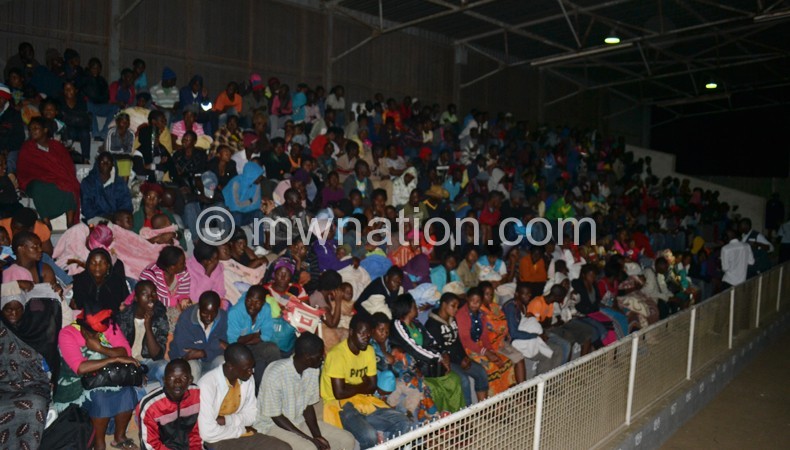Tears of xenophobia victims
At around 8pm last Monday, six buses bearing South African registration entered the Kamuzu Stadium in Blantyre one after the other.
On board were 390 repatriated Malawian victims of xenophobia attacks in Durban, South Africa.

It was an unusual sight. The last time bus loads drove round the pitch was during the 2009 campaign—when former president the late Bingu wa Mutharika was launching his second term campaign.
But this was different. Hundreds of Malawians trapped in South Africa following the xenophobic attacks were finally off the hook.
For the six days prior to the repatriation, their life had been on the edge. Making it home alive was a dream come true.
According to government, two Malawians died in the attacks, which are said to have erupted following a hate statement that Zulu king Goodwill Zwelithini made against foreigners to leave South Africa.
However, the arrival of the xenophobia victims was somber.
Untold stories of agony were pasted all over the victims, faces as they disembarked from the buses parked in front of the very important people (VIP) stand. No smile could be seen on their faces. Even Minister of Information, Tourism and Culture Kondwani Nankhumwa, and his Home Affairs and Internal Security counterpart Atupele Muluzi could not believe their eyes. At one point, Muluzi was seen shaking his head in disbelief.
Most of the victims were in the 15 to 38 age range. Again, most of them had wounds or swollen bodies. Their dressing and impoverished look made one wonder whether South Africa is really worth all the trouble these people went through.
Of course, a good number lost their belongings to the attackers, such that the clothes they wore was all they had left. Others did not even have shoes. Those who suffered deep cuts or were seriously ill on arrival were taken straight to Queen Elizabeth Central Hospital (QECH) for treatment.
Some women escaped while pregnant, others such as, Emily Beaton from Mangochi had to protect their small children from biting winds at the camp for two nights with nothing but a chitenje cloth she escaped with.
“I thank God that I am alive. I saw my house being looted by neighbours and friends being beaten to death. I have returned completely empty-handed,” said another victim Zione Khombeza of Mbayani Township in Blantyre.
Yusuf Amidu, the group’s team leader, said: “We are ashamed and everyone is traumatised. We feel disgraced by the attacks, but it is good that we are home. The tears from the group represent both joy and pain. I thank government for coming to our rescue but there are still thousands there.”
The majority described South Africans as beasts, saying it was people they knew that broke into their houses and asked them to choose life or death.
Describing how she escaped and spent two nights in a forest, Virginia Joseph said she was sleeping with her husband when they heard noises and a loud bang on their door. Soon the attackers, armed with steel bars, were in. They brutally pushed them out, forcing them to run for dear life to the nearest forest.
Another victim, Amina Masuako, says with her child, she spent a night along a river before seeking shelter at a police station.
Most victims swore they will never return to South Africa because the attacks have shown them the kind of people South Africans are. They also revealed that even at workplaces, they never enjoyed freedom. Most of them worked in shops, homes and farms, where, they say, they earned peanuts.
For instance, Masuako, who says she saw a Malawian being killed by the attackers in Isipingo Beach in Durban, says she worked at a plastic recycle company and earned R400 (about K16 000) per week and R1 600 (about K64 000) per month. Out of that, she would spend R700 (about K28 000) on rent, the rest on minibus fares and food.
Others who worked in shops said they earned between R1 000 and R2 000 (about K40 000 and K80 000) per month, a figure which is not much considering the high cost of living in South Africa.
On behalf of the group, Amidu asked government to creating jobs or businesses for youths, saying Malawians are exploited in South Africa because what they earn is only enough for their survival. They thus called for a review of the minimum wage.
Government says 3 200 more Malawians will be repatriated from South Africa. An additional 509 arrived in the country on Friday.
The recent attacks come four years after similar attacks in 2008.






But why?????